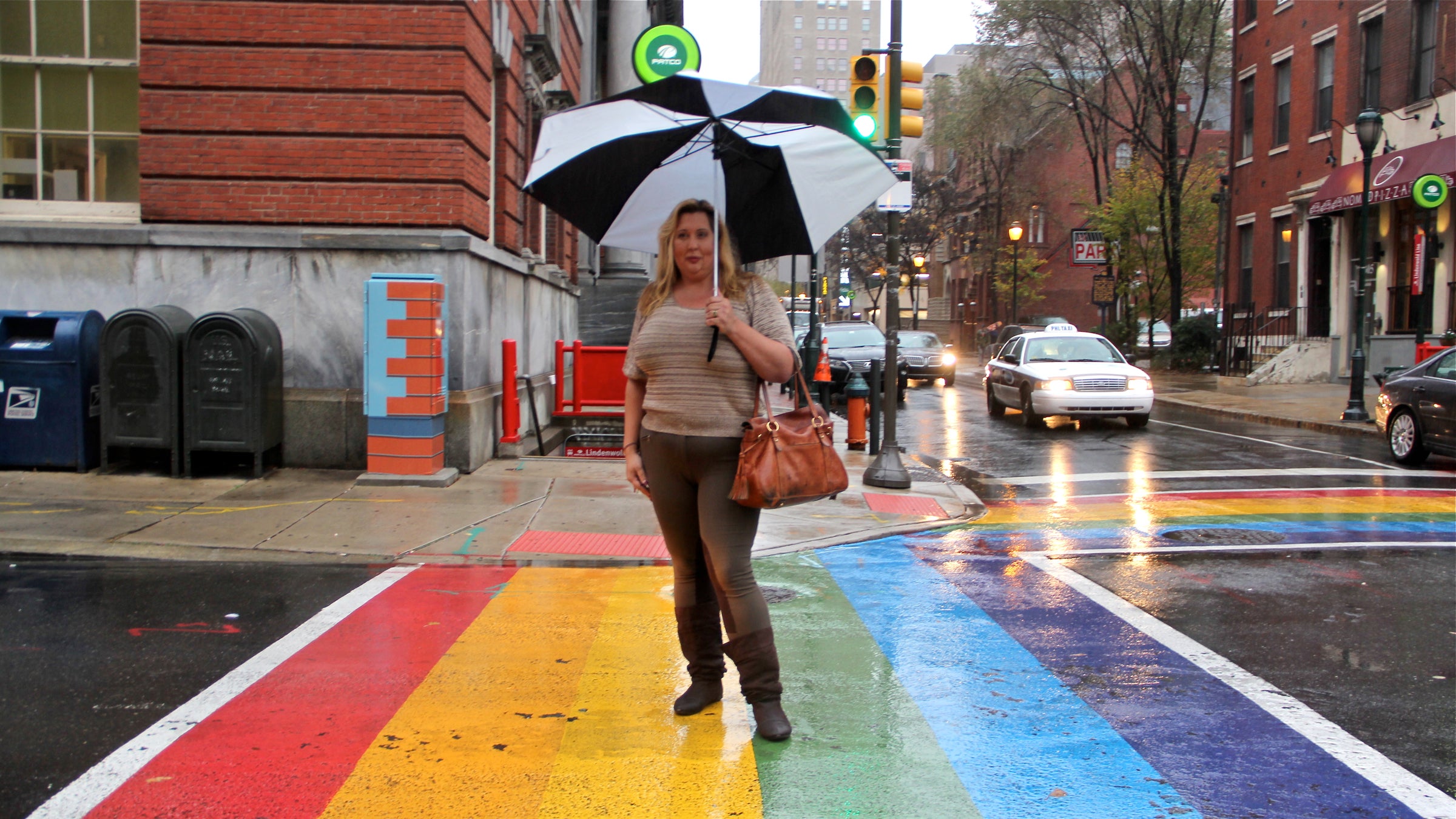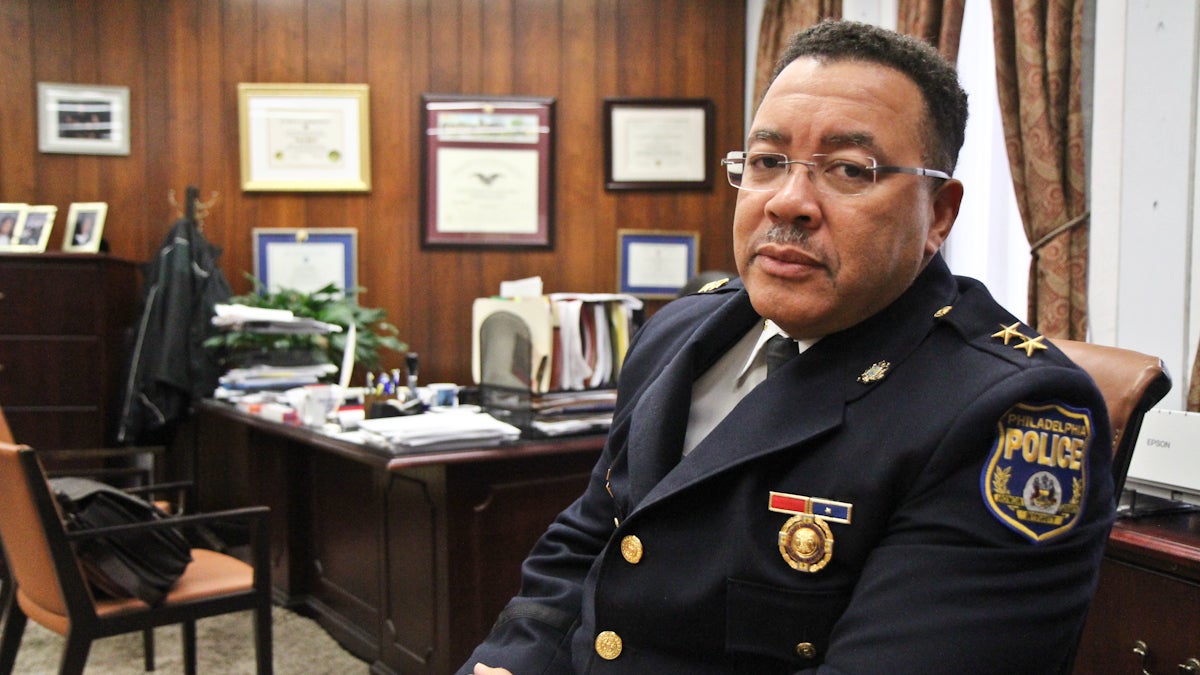Philly police and transgender community build trust amid grief
Listen
Deja Lynn Alvarez stands at the intersection of 13th and Locust streets
When 27-year-old Kyra Cordova was murdered on Sept. 3, 2012, it took the police a week to notify her mother.
Cordova was shot in the head and police found her body near a wooded area in Northeast Philadelphia. Her purse had been stolen, along with her ID and her cell phone.
It took several days before police identified Cordova by running her fingerprints. “Luckily,” said her mother Dawn Maher, she had been arrested once.
Maher said what didn’t help was the fact the police department misidentified her daughter. Early news reports described Cordova as a “man who was dressed as a woman.”
“It was insulting,” said Maher.
Cordova had identified as a woman for 10 years and had her name legally changed.
Maher believes that if the police department had described her to the media as a woman and mentioned the large tattoo of a phoenix on her back, it might not have taken a full week before officers from her local police department in Montgomery County came to her home to tell her her daughter was dead.
She also might not feel so guilty three years later.
“Knowing that my baby laid in the morgue for a week with no one to come and claim her was devastating to me… because that just says you don’t care,” Maher said. “If I’d known in an hour, I’d have been camped out down the city waiting for her body come in. It wouldn’t have even gotten cold.”
At the time, Nellie Fitzpatrick was a prosecutor with the Philadelphia District Attorney’s office. She was also the office’s LGBT liaison.
When she heard the report of a “dead man who was dressed as a woman,” Fitzpatrick skipped over the chain of command and called up the homicide unit herself. She told the officer who picked up the phone that the department was misidentifying the victim.
“This isn’t who the person is so if you’re looking for somebody who’s murdered, this woman, you’re not going to find them by talking about her in the way that you are,” she said.
That didn’t go over well with her superiors and the homicide officer she talked to didn’t take kindly to her telling him how the department should be handling the case.
Fitzpatrick, who is now the director of the mayor’s office of LGBT Affairs, admitted she shouldn’t have broken the D.A.’s chain of command, but she remains unapologetic about her motivations.
“It was very painful to see the whole community grieving for somebody that had been murdered so violently, so young,” she said. “And then the continuous and vicarious trauma of the misreporting and the misinformation and the lack of respect and dignity this person was shown at the end of their life. It was heartbreaking.”
It was also past time for a change, Fitzpatrick said.
‘With each death, we seem to take a step forward’
Friday is the Transgender Day of Remembrance with memorials and vigils being held across the country to remember trans people who have been murdered.
Last month, Keisha Jenkins became the second transgender woman killed in Philadelphia this year, the 20th in the country and the 18th transgender woman of color. Jenkins was brutally beaten and shot in the back during an attempted robbery.
Before Jenkins’ murder was made public, the Philadelphia Police Department worked with a group of LGBT advocates to make sure they were accurately identifying her. It’s the result of many years of efforts to build trust between the transgender community and the police.
“With each death, we seem to take another step forward, we seem to progress,” said transgender advocate Deja Lynn Alvarez. “The way that I like to put it is that it’s being made, unfortunately, off of the deaths of my sisters.”
Now, Alvarez is one of the first people the department calls when a transgender person is victimized. As a member of the LGBT Police Liaison Committee, she brings concerns of the community straight to the department and helps determine victims’ gender identities.
Last Friday night, Alvarez went on a ride-along with the head of the department’s vice unit and his deputy. She sat in the back of the police vehicle as they drove to some of the areas where transgender sex workers gather. Alvarez introduced the officers to some of the women and answered their questions or as she put it, “add[ed] a human touch.”
That’s huge, considering Alvarez sued the police department back in the mid-1990s.
Recently, she took me to the corner of 13th and Locust Streets in Philadelphia’s “Gayborhood.” Today, the crosswalks at the intersection are painted in rainbow colors. That was not the case 20 years ago when Alvarez and a friend stood on that corner, trying to hail a cab one night after hitting a few bars. They were careful to stand a block away from “the stroll,” where sex workers looked for business. It didn’t help.
A police officer pulled up to the curb next to them. According to Alvarez, the officer said over his loudspeaker, “I told you f—ing animals to go the f— home.”
“I don’t know what it was about that moment, but I just couldn’t take it anymore,” she said. “After years and years and years of suffering the abuse — emotional, physical, mental — from the police officers, that was it.”
Eventually, Alvarez settled with the city. One of the terms was that police officers who work the Gayborhood receive sensitivity training.
Today, she’s one of the people who trains all new police cadets.
While Alvarez feels safe when she sees police officers in Philadelphia, she knows a lot of other transgender people who don’t.
“What I’m able to do now is tell them it doesn’t have to be that way,” she said.
Holding police officers accountable
Not long after Kyra Cordova’s murder, Nellie Fitzpatrick worked with the police department to develop a directive (that’s cop-speak for a set of rules officers must follow when working with the LGBT community).
“At that point in time, there was… nothing telling the police, ‘This is exactly what you have to do,'” said Fitzpatrick.
As of December 2013, Philadelphia police officers have been required to address or refer to transgender people using their preferred names and pronouns.
A large part of Alvarez’s work is explaining the directive to the LGBT support groups she facilitates. She tells them what officers are required to do and that if the officers don’t comply, they have the right to file a complaint.
Alvarez and Fitzpatrick say the directive has made a big difference in the cases that followed Cordova’s.
“There’s tons of work to do, but the change has been profound,” said Fitzpatrick.
Identifying the dead by the way the way they lived is one important step, she said, but it’s time for a culture change within the police department.
 Kevin Bethel is Deputy Commissioner of the Philadelphia Police Department. (Kimberly Paynter/WHYY)
Kevin Bethel is Deputy Commissioner of the Philadelphia Police Department. (Kimberly Paynter/WHYY)
Deputy Commissioner Kevin Bethel, the department’s LGBT liaison, said that change is happening, albeit slowly.
“We have men and women in our workforce now who get it, who come to this process understanding we have a responsibility to serve our entire community,” said Bethel. “If you’re a police officer today who sits out there who hates someone… because of how they identify themselves or how they look, then you need to go look for another job.”
Bethel is retiring at the end of the year, along with Police Commissioner Charles Ramsey, but he’s confident their successors will keep building on the relationships they’ve made with the transgender community. Bethel said Mayor-elect Jim Kenney — widely recognized as an ally of the LGBT community — and his pick for police commissioner, Richard Ross, will not let that momentum falter.
‘I wish I had known’
Kyra Cordova’s murder remains unsolved.
Police are still offering a $25,000 reward for information leading to the arrest or capture of the person responsible.
Her mother, Dawn Maher, said she maintains her sanity by sticking to routines and finding joy in her job as a bus driver for special needs students in the North Penn School District in Landsdale, Montgomery County.
Maher takes some solace that her daughter’s death has made some difference in other cases like Keisha Jenkins’.
“Keisha they were able to identify her in an hour, which is fantastic,” she said, “but I wish I had known in an hour.”
WHYY is your source for fact-based, in-depth journalism and information. As a nonprofit organization, we rely on financial support from readers like you. Please give today.

